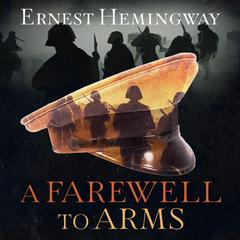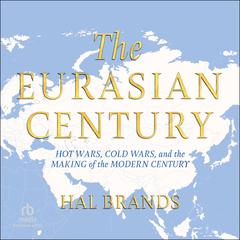 Play Audiobook Sample
Play Audiobook Sample
Across the River and Into the Trees Audiobook
 Play Audiobook Sample
Play Audiobook Sample
Quick Stats About this Audiobook
Total Audiobook Chapters:
Longest Chapter Length:
Shortest Chapter Length:
Average Chapter Length:
Audiobooks by this Author:
Publisher Description
A poignant tale of a revitalizing love that is found too late—the fleeting connection between an Italian countess and an injured American colonel inspires light and hope, while only darkness lies ahead.
In the fall of 1948, Ernest Hemingway made his first extended visit to Italy in thirty years. His reacquaintance with Venice, a city he loved, provided the inspiration for Across the River and into the Trees, the story of Richard Cantwell, a war-ravaged American colonel stationed in Italy at the close of the Second World War, and his love for a young Italian countess.
A bittersweet homage to love that overpowers reason, to the resilience of the human spirit, and to the world-weary beauty and majesty of Venice, Across the River and into the Trees stands as Hemingway's statement of defiance in response to the great dehumanizing atrocities of the Second World War.
Download and start listening now!
"Hemingway masterfully uses dialog and character interaction to tell this story. 'Across the River and Into the Trees' is about a somewhat estranged US Army Colonel who spends the last three days of his life in Venice, Italy. The aging veteran of two World Wars knows his end is very near, so he visits his 19-year-old paramour and his friends in the city of canals, gondolas, and such. The Colonel's interactions with other characters, ghostly memories of his demotion from the rank of General, and all the bloody battles he has fought, continually flit through his mind. The Colonel is a fighting officer in nearly every aspect of his life. To him, class and occupation seem to be mere euphemisms for rank. He treats servers and attendants as underling soldiers. The people who don't understand how he thinks suffer the wrath of his quick temper. Even his love life and friendships are subject to the war metaphors that run throughout this novel. Written in third-person limited narration, 'Across the River and Into the Trees' is an elegy of sorts, which verbose authors should study and emulate. Hemingway reveals an intricate plot of a man's last days, and he also painstakingly crafts his characters throughout this relatively fast-paced classic. I didn't have to constantly remind myself to be patient while reading this one. It moved along quickly, yet it also `gave me a chance to ponder the deep and multi-faceted symbolism exhibited through The Colonel's reflections and internal conflicts."
— Tim (5 out of 5 stars)
Quotes
-
“Real class.”
— John O'Hara, New York Times Book Review -
“[But] its hauntingly tired cadences are the direct speech of a man's heart who is speaking that directly for the first time, and that makes it, for me, the finest thing Hemingway has done.”
— Tennessee Williams, The New York Times -
“He can perform prodigies. He can fascinate us by pure evocation, by the tensity of the situation.”
— Times Literary Supplement
Awards
-
Pulitzer Prize
-
Nobel Prize
Across the River and Into the Trees Listener Reviews
-
" Not Hemingway's best book, in my opinion. I read it during a couple of days in Venice and found it atmospheric and wonderfully melancholic....if a bit meandering "
— Jennifer, 2/12/2014 -
" By far Hemingway's worst work. "
— Dr., 1/23/2014 -
" I could not resist the oppurtunity to read another Hemingway classic, especially since I spend a great deal of time in the Venice,Italy area. The Dolomite mountains north of Venice has to be one of the most breathtaking natural treasures of the world. Visit Cortina and see for yourself. Hemingway takes the reader to one of the most charming and romantic locations in all the world as a backdrop to this haunting love story. I enjoyed this novel very much, the truth about the fraility of life and love was always about, never letting the reader break free from its grasp. JJF "
— Johnny, 1/21/2014 -
" Not really my kind of thing. A middle-aged Colonel has an affair with a young girl and dies. Very slow moving in fact nothing happens. "
— Neil, 1/9/2014 -
" His worst book, and one that really saddens me. Reading it now, it stands almost as a parody of the great writer and his style. No one wants to see that. "
— Steve, 12/23/2013 -
" Read the first chapter or two about duck hunting in Venice, and then stop. The rest is not good, especially if you like Hemingway. "
— Jordan, 9/27/2013 -
" I loved this book. But then again I read it in Verona Porta Nuova station after visiting Venice, waiting for a night train to Paris, in the rain, and I think this may well be the best book to read in Verona Porta Nuova station after visiting Venice, waiting for a night train to Paris, in the rain. "
— Louis, 9/27/2013 -
" pearl harbor day seemed an appropriate time to read a wwii-era hemingway novel. quick read although some passages dragged. helps to have a general knowledge of wwii (and even wwi) in order to grasp references and maintain the flow of the book. "
— Darren, 9/1/2013 -
" Least favorite Hemingway book. "
— Jeff, 7/19/2013 -
" not the best hemingway i've read. it took me a while to get through it... "
— nikki, 5/14/2013 -
" It was just dreadful. How did this book win a Nobel prize? "
— Susana, 3/11/2013
About Ernest Hemingway
Ernest Hemingway (1899–1961), born in Oak Park, Illinois, started his career as a writer in a newspaper office in Kansas City at the age of seventeen. After the United States entered the First World War, he joined a volunteer ambulance unit in the Italian army. After his return to the United States, he became a reporter for Canadian and American newspapers. During the twenties, Hemingway became a member of the group of expatriate Americans in Paris, which he described in his first important work, The Sun Also Rises. He also wrote Farewell to Arms, For Whom the Bell Tolls, and The Old Man and the Sea, the story of an old fisherman’s journey, his long and lonely struggle with a fish and the sea, and his victory in defeat. He also wrote short stories that are collected in Men Without Women and The Fifth Column and the First Forty-Nine Stories. Hemingway died in Idaho in 1961.
About Boyd Gaines
Boyd Gaines is an Earphones Award–winning narrator and an actor whose many film credits include Second Best, I’m Not Rappaport, Heartbreak Ridge, Fame, and Porky’s. He’s won two Tony Awards for performances in the The Heidi Chronicles and the musical She Loves Me. On television he has appeared in A Woman Called Jackie, A Son’s Promise, and in the popular series One Day at a Time.









































